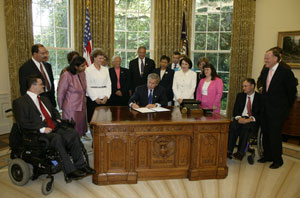About the Committee
 |
In honor
of the 13th anniversary (July 26, 2003) of the Americans with
Disabilities Act, President George W. Bush signs the Executive
Order renaming The President's Committee on Mental Retardation
to The President's Committee for People with Intellectual Disabilities
(PCPID) in the Oval Office Friday, July 25, 2003. In addition
to witnessing the signing, the PCPID were on hand to hear President
Bush record his weekly radio address. |
It is estimated that between 7 and 8 million Americans of all ages, or three percent of the general population, experience intellectual disabilities. Nearly 30 million, or one in ten families in the United States, are directly affected by a person with intellectual disabilities at some point in their lifetime. In 1966, in order to ensure the right of a “decent, dignified place in society” for people with intellectual disabilities, President Lyndon B. Johnson established The President’s Committee for People with Intellectual Disabilities (PCPID), formerly The President's Committee on Mental Retardation, to focus on this critical subject of national concern. Since that time, the President’s Committee has served in an advisory capacity to the President and the Secretary of Health and Human Services on matters relating to persons with intellectual disabilities.
Since its inception, the President’s Committee has led the charge to improve the lives of people with intellectual disabilities, most recently adopting the goals outlined in President George W. Bush’s New Freedom Initiative to recognize and uphold the right of all people with intellectual disabilities to enjoy a quality of life that promotes independence, self-determination, and full participation as productive members of society. These goals include the assurance of full citizenship rights, the reduction of the occurrence and severity of intellectual disabilities and the promotion of forward thinking programs and services and cutting edge assistive technologies to improve the lives of people with intellectual disabilities.
The Committee consists of 21 citizen members appointed by the President and thirteen ex officio (Federal Government) members designated by the President. The thirteen ex officio members include the Secretary of Health and Human Services, Secretary of Education, Secretary of Labor, Secretary of Housing and Urban Development, Secretary of Commerce, Secretary of Transportation, Secretary of Interior, Secretary of Homeland Security, the Attorney General, the President and CEO of the Corporation for National and Community Service, the Chair of the Equal Employment Opportunity Commission, the Chair of the National Council on Disability and the Commissioner of the Social Security Administration. The President’s Committee is led by an executive director, also appointed by the President, and supported by a team of federal employees.
For additional information, please contact:
The President’s Committee for People with Intellectual DisabilitiesThe Aerospace Center, Suite 210
370 L'Enfant Promenade S.W.
Washington, DC 20447
Telephone: 202-619-0634
Fax: 202-205-9519




